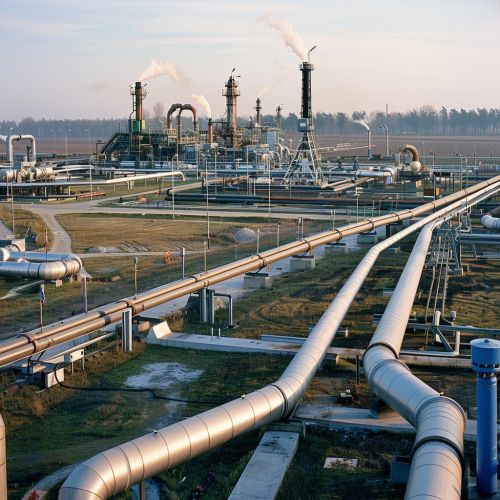Natural gas
Overview
Natural gas is a naturally occurring hydrocarbon gas mixture consisting primarily of methane, but commonly including varying amounts of other higher alkanes, and sometimes a small percentage of carbon dioxide, nitrogen, hydrogen sulfide, or helium. It is formed when layers of decomposing plant and animal matter are exposed to intense heat and pressure under the surface of the Earth over millions of years. The energy that the plants originally obtained from the sun is stored in the form of chemical bonds in the gas.


Formation
Natural gas is a fossil fuel, like oil and coal. It is formed from plants and tiny sea creatures that died millions of years ago. Over time, layers of mud and plant material built up over the remains, creating pressure and heat that transformed the organic material into natural gas. This process, known as diagenesis, occurs over millions of years and results in the formation of natural gas reservoirs.
Extraction
The extraction of natural gas begins with drilling a well. These wells are purpose-drilled for natural gas, but because natural gas is often found in the same deposits as petroleum, sometimes natural gas extraction is a side-operation of oil extraction, or is pumped back into the well for future extraction. Once extracted, natural gas is sent through small pipelines called gathering lines to processing plants, which separate the various gases and remove impurities.
Processing
Natural gas processing includes the removal of impurities and the extraction of valuable non-methane components. The processed natural gas, known as pipeline quality dry natural gas, is then transported to consumers through a vast network of pipelines.
Uses
Natural gas is used in a variety of applications. It is used as a source of energy for heating, cooking, and electricity generation. It is also used as a fuel for vehicles and as a chemical feedstock in the manufacture of plastics and other commercially important organic chemicals.
Environmental Impact
While natural gas is often touted as a clean energy source, it does have environmental impacts. The extraction process can cause land disturbance and water contamination, and the burning of natural gas releases carbon dioxide, a potent greenhouse gas. However, when compared to other fossil fuels like coal and oil, natural gas is a cleaner and more efficient source of energy.
